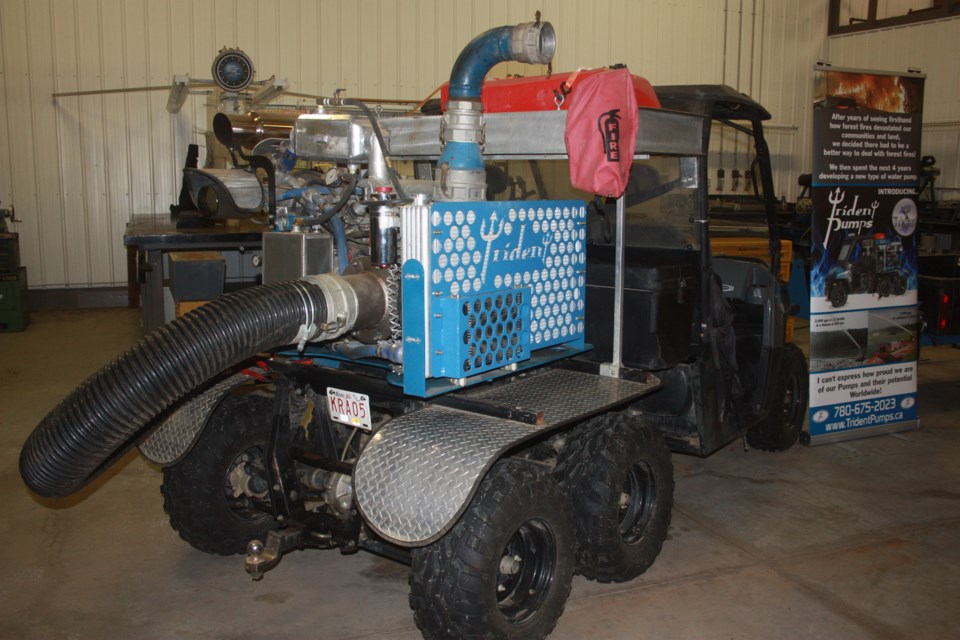ATHABASCA - Athabasca’s Trident Pumps has developed lightweight, rapid deploying, high pressure, transportable pumps for wildland firefighting, flood mediation and structural protection.
Kevin Younker, owner and inventor, and Rick Baksza the COO with Trident Pumps put on a demonstration and talk for Athabasca town and county councils as well as the Athabasca and Thorhild fire department representatives Dec. 12 in Athabasca.
“It’s more of a Swiss Army Knife than just a fire fighting tool,” Baksza stated. “It’s a community protection system.”
Trident’s unique patented pump design allows for the combination of multiple pump curves in one lightweight unit making it a must-have piece of equipment for emergency service and first responders.
“A Cat C-Nine engine weighs 9,000 pounds has 800-pound feet of torque spins at 2,000 rpm and after the Slave Lake fire, I wanted all the variables and I said ‘Well, let’s lose that engine,” Younker explained in coming up with the design. “I used a 1000 cc Yamaha engine modified to have 600 horsepower and a CVT, which is continuously variable transmission.”
The Trident pump drive can apply up to 1,313 lb. ft. of torque at the impeller, while only weighing between 550 lbs. and 650 lbs. depending on which options are chosen.
An impeller is a rotating component of a centrifugal pump that transfers energy from the motor driving the pump to the fluid being pumped by accelerating the fluid outwards from the center of rotation and due to their patented design you can swap out a Trident impeller in 20 minutes.
“We can suck mud, pea gravel, and rocks; it doesn’t matter what comes in, it’s not going to damage your pump,” Younker stated.
The pump uses 100 per cent of the available power at full engine RPM and is self-adjusting to meet a flow or head constraint regardless of the suction or piping configuration.
“What my engine does is — I’ll set my engine at 8000 RPM — you set it and forget it,” Younker continued. “It doesn’t matter what you do on the other end, that engine will stay at 8000 RPM until the MPC 20 control module tells it shut off.”
Trident pumps move water farther and at higher pressures than most conventional pumps, meaning the pumps can perform as well as pumps that weigh over 10,000 lbs., plus they are completely portable. They can be mounted on a six-by-six all-terrain vehicle, the back of a truck, moved by helicopter, or on a trailer.
“If you’re trying to push water up a little way and it’s more than 7,600 pounds, that end shafts going to snap right off, (other pumps) lose impellers all the time,” Younker said. “We have a one-inch shaft and we can handle 80,000 pounds of axial load due to our design; that’s more than 10 times more than these other pumps.”
The pumps are not just for firefighting; they can be used for flood relief, mine de-watering, dredging, ecological clean up and oil field applications.
“Rapidly responding to these situations can drastically reduce stormwater from infiltrating wastewater systems, greatly reducing sewer system overloaded,” Baksza explained describing one use.
Trident Pumps offer provincial and private structure protection services, as well as wildland urban interface (WUI) firefighting crews.
They have been deployed to various fires, notably the Fort McMurray fire and are also under contract with both Alberta and British Columbia Forestry. They have also completed work on designing a mobile package for municipalities which consists of a trailer carrying one pump unit, hose deployer and a long-range sprinkler package with onboard fuel tanks and transfer pumps.
“We have the ability to reach your fire faster and better the chance of containment quickly and effectively attacks fires while knowing your team and equipment have the means to safely evacuate,” Baksza stated. “(It) requires less personnel to operate giving you the ability to attack without depleting resources.”
Trident Pumps have two patents, one for the pump and one for the clutch, and have filed for patents in 54 additional countries.
“We just got a letter from Australia, from the Australian Patent Office saying, ‘In the interest of public safety, please finalize your patent,’” Younker said. “So, they’re saying ‘We’re accepting your patent as it is right now; hurry up and get it done because we’re burning down.’”



